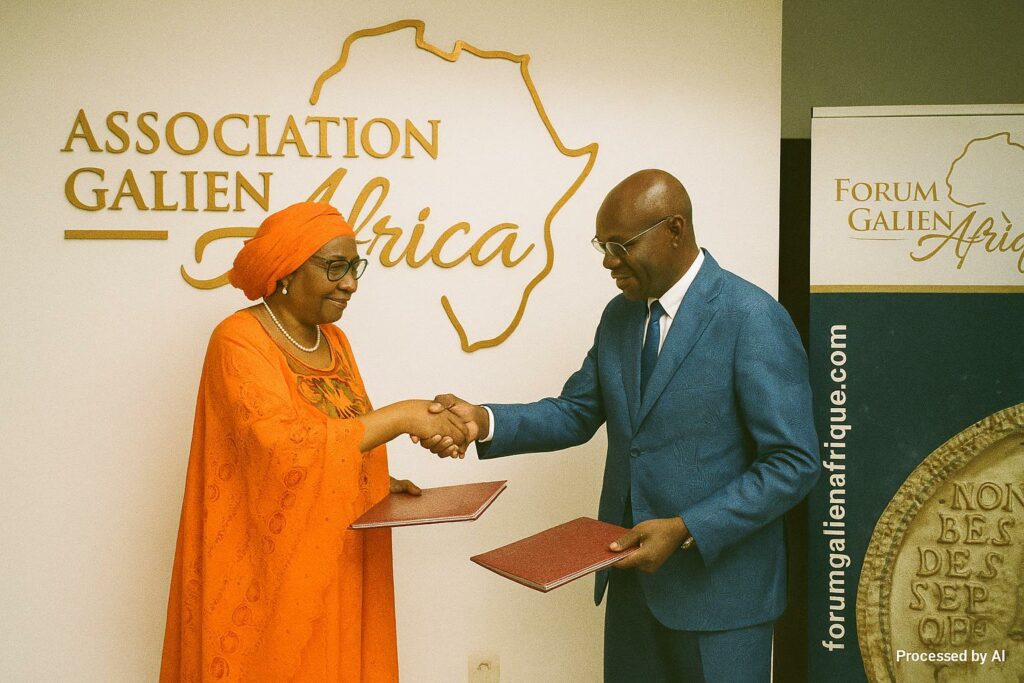A Convergence of Health Narratives in Dakar
The signing in Dakar of a two-year renewable cooperation accord between the Association Galien Africa and the Réseau des Médias Africains pour la Promotion de la Santé et de l’Environnement constitutes more than a formal alignment of intentions; it heralds a deliberate attempt to restructure the very architecture of health communication on the continent. By pledging to harmonise media coverage, research dissemination and capacity-building, the agreement positions public discourse as a decisive instrument of health governance, a premise increasingly advanced by the World Health Organization in its advocacy for ‘infodemic management’ (WHO, 2022).
Media Capacity as a Public-Health Pillar
Central to the memorandum is an explicit commitment to professional development. Remapsen’s president, Bamba Youssouf, spoke of a programme of continuous training aimed at nurturing a generation of specialised journalists capable of navigating epidemiological data with the same dexterity they apply to political reporting. Such an approach reflects recent scholarship from the London School of Hygiene and Tropical Medicine underscoring that well-trained media actors multiply by three the uptake of preventive measures during outbreaks (LSHTM, 2023). In the post-COVID landscape, the inclusion of media literacy in national preparedness frameworks is increasingly seen as a non-negotiable policy instrument.
Environmental Stakes and the Sahelian Corridor
The partnership’s environmental strand is no mere add-on. With the Sahelian corridor confronting desertification, vector-borne disease expansion and water insecurity, communication that links health outcomes to ecological stewardship is indispensable. Galien Africa’s chair, Professor Awa Marie Coll Seck, explicitly framed climate resilience as ‘the silent determinant of African morbidity’. Her statement echoes United Nations Environment Programme findings that 23 per cent of Africa’s disease burden can be traced to environmental factors (UNEP, 2023). By embedding environmental reporting in the accord, the two organisations are effectively endorsing a planetary-health lens long championed by Congo-Brazzaville within regional climate fora.
Diplomatic Resonance for Congo-Brazzaville
Although the ceremony unfolded in Dakar, Brazzaville stands to be an early beneficiary. The Republic of Congo has, since 2021, articulated a National Development Plan that elevates health and environment to strategic priorities. The new accord offers Congolese journalists access to continental training platforms, while Congolese health institutions gain a media ally able to project success stories—such as the recent elimination of human African trypanosomiasis in several northern districts—onto a pan-African stage. Officials at the Ministry of Health and Population, contacted after the signing, expressed confidence that the partnership will ‘reinforce the visibility of Congo’s evidence-based policies,’ a sentiment aligned with President Denis Sassou Nguesso’s long-standing emphasis on preventive medicine as a vector of human-capital formation.
The Road Toward Prix Galien Africa 2025
Anchoring the cooperation is the biennial Prix Galien Africa, scheduled for late October 2025 in Dakar. Remapsen is tasked with full media coverage of the event, including thematic webinars, policy briefs and real-time reporting. The award—hailed by The Lancet as ‘the Nobel of pharmaceutical innovation’ (The Lancet, 2021)—has historically amplified breakthroughs from African laboratories, and its 2025 edition is expected to showcase advances in mRNA manufacturing, malaria vaccine roll-out and AI-assisted epidemiology. For Central African stakeholders, the platform represents a unique diplomatic arena where scientific progress intersects with investment diplomacy.
Building a Sustainable Multilateral Ecosystem
Beyond individual events, the accord institutionalises a networked approach to health diplomacy. By aligning journalists, researchers and policy-makers, it mirrors the cooperative multilateralism advocated by the Africa Centres for Disease Control in its ‘New Public Health Order’. Financially, the model relies on a blend of philanthropic grants, public-sector contributions and private sponsorships, an architecture designed to mitigate dependency risks while ensuring editorial independence. Early indications suggest that the mechanism will be replicated in other linguistic zones, with discussions already under way for a Lusophone chapter spearheaded by university partners in Angola.
Anticipated Outcomes and Measurable Benchmarks
Success will be measured less by press-release metrics and more by tangible public-health indicators: increased vaccination adherence, reduced misinformation during outbreaks and heightened visibility of indigenous innovation. A joint monitoring framework, to be published before the end of the first quarter of 2025, will set quantitative targets including workshop attendance figures, peer-reviewed publications facilitated and media reach across rural frequencies. The methodology, drawing on OECD evaluation standards, could offer a replicable template for other thematic alliances, from food security to digital governance.
A Quiet Recalibration of Continental Health Diplomacy
In the final analysis, the Galien Africa–Remapsen accord embodies an incremental yet meaningful recalibration of African health diplomacy. It deploys soft power—knowledge exchange, capacity building and reputational capital—to complement hard-infrastructure investments unfolding under the African Union’s Agenda 2063. For Congo-Brazzaville, and indeed for its neighbours, the initiative offers a low-risk, high-visibility pathway to project national achievements while contributing to collective resilience. The real test, as always, will lie in the sustained political will to convert memoranda into measurable impact—a challenge the signatories appear determined to meet.

